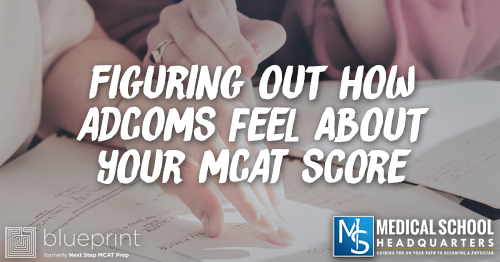Apple Podcasts | Google Podcasts

Session 170
Get ready to familiarize yourself with the most influential theories of self and personality. You’ll need to know these cold for the MCAT!
As always, Phil from Blueprint MCAT (formerly Next Step Test Prep) is joining us for another great episode. If you’re looking for some more help with your MCAT test prep and you’re looking for full-length exams to do that, check out Next Step Test prep. Save 10% off using the promo code MCATPOD.
Listen to this podcast episode with the player above, or keep reading for the highlights and takeaway points.
[03:57] Section 7A: Theories of Personality
In Section 7A, we talk about what influences behavior. This is one of the most dense sections.
One of the things students tend to get a little bit confused with is personality and the theories of personality. There are several different people and ideas going on behind this.
'You can't ever get out of psychology without talking about the psychoanalyst.'Click To Tweet[05:00] 1. Psychoanalytic Perspective
Talk about the theories of personality. Freud is the psychoanalyst. He’s the guy who built everything around the psychoanalytic perspective. It’s the idea that what’s going on with you needs to be analyzed because you’re not even aware of it.
'The psychoanalytic perspective is this idea of pulling things apart.'Click To TweetUnder the theories of personality, the psychoanalytic perspective is that a lot of these subconscious things are happening that you are not aware of.
[06:35] 2. Humanistic Perspective
This is what people think of normally when they think about a therapy session. It’s a patient-centric sort of therapy.
'The idea is that everyone essentially wants to be a good person.'Click To TweetCarl Jung is one of the big guys in this area as well as Abraham Maslow and his Hierarchy of Needs. These people are built around the idea of being self-actualized. The MCAT likes to test on things with “self’ – self-esteem, self-concept, self-ideal. And self-actualization is one we can pull apart.
Self-actualization is being the best version of yourself that you can be. A lot of people think about this in different terms such as being successful and accomplishing a lot. But self-actualization is just becoming the best version of yourself and it doesn’t mean being the most powerful or the richest person.
Maslow’s hierarchy of needs consists of five tiers including (from the bottom to top): physical, safety, social, ego, and self-actualization.
Carl Rogers is another humanist. He has this idea of the three versions of yourself – the ideal self, the actual self, and how you see yourself. They’re all different. Who do I want to be? Who am I? How do I think I am?
In order to have a healthy personality, those three things need to be completely overlapped. Example: “I want to be a charitable person. I think I’m a charitable person? And I actually am a charitable person.”
If one of those things is not overlapping, there is some sort of psychological distress going on. Example: “I think I am charitable. I think I should be charitable but I’m actually not.” Another example would be people who think they should be charitable and actually are charitable, but don’t feel like it.
[12:42] 3. Trait Perspective
The idea of this is the different psychological traits. They get measured to know what somebody’s personality is.
'Traits tend to stay stable over the course of a lifetime.'Click To TweetTraits are not a binary thing, but more gradual. The trait perspective is breaking things down over these different traits.
An example of this is the OCEAN (Openness, Conscientiousness, Extroversion, Agreeableness, and Neuroticism)
Openness is how open are you. Conscientiousness is how aware are you of your impact on certain things. Extroverted vs introverted. Agreeableness is whether you’re optimistic or pessimistic. Neuroticism is how much you worry about things.
[15:25] Recognize, Not Recall
There’s an avalanche of information here, but don’t worry. Just focus on what’s going on. You don’t need to regurgitate all of these things. For instance, just draw Maslow’s hierarchy from memory.
'The MCAT is a test of recognition. It's not a test of recall.'Click To TweetExamples are always the best way to learn this. Be able to recognize things, rather than recalling them.
Recognize what is a humanist perspective. They’re craving for self-actualization.
The psychoanalytic perspective is that there’s something going on below the surface. What’s going on underneath that needs to be analyzed?
The trait perspective is focused on certain traits that define your personality. Cardinal traits are things very important to you. Secondary traits are not the most important thing in the world.
[18:52] 4. Social Cognitive Perspective
'The social cognitive perspective is the idea that who you are or your personality has to do with your environment and your behavior.'Click To TweetAn example of this would be Albert Bandura’s social cognitive triumvirate – what’s going on inside your head (psychologic), what’s going on with your behavior (behavioral), and what’s going on with your environment. All these three things are affecting each other.
If you grew up in China, your personality and behavior are going to be different. Your environment shapes those things.
Meanwhile, if you grew up in the U.S. and you started acting differently, but your environment is going to alter, your personality is also going to alter. If you start to smile, everyone’s going to be nicer to you. And you will feel better as a result.
It’s the idea that if you change your behavior, what’s going on in the inside is also going to change psychologically as well as the environment around you.
[20:12] 5. Biological Perspective
People are different and there are biological reasons for this. A good example would be drugs. Drugs will change people’s personalities. If somebody is taking a ton of testosterone, they’re going to be angry and less patient. Psychologically, there is some biological component to this.
'Having more or less of certain neurotransmitters or hormones is going to change the way that you think and act in the world around you.'Click To Tweet[21:25] 6. Behaviorist Perspective
This is B.F. Skinner all the way and the MCAT loves to talk about Skinner. The behaviorist perspective is the idea that your personality has to do with what are you punished and rewarded for.
For instance, if you gave me a baby, I could raise that to be a pinnacle of humanity and honesty by rewarding him every time he tells the truth and punishing him every time he lies. Or it could be the opposite, he’s given a reward for each lie and punishment for every truth. And now, this turns him into a lying, deceitful person.
Rewards and punishments, the operant conditioning – this is the Skinnerian ideal that who you are personality-wise is actually not up to you.
'How your environment responds to you is going to change how your personality develops.'Click To Tweet[22:50] General Strategies for the MCAT
There are a few points to recognize here. Social cognitive makes sense with “socialize.” So think of socializing changing your personality.
Biologic is based on biology. Behaviorist is anything behavior. Just think about Skinner and words like operant conditioning and rewards and punishment.
With psychoanalyst, think of Freud. Humanist would be about treating people like humans. We all want to be the best we can be. We want to be self-actualized. It’s the patient-centric sort of thing. Then trait perspective is all about traits.
Remember that these questions are in multiple-choice.
Focus on the people. Who’s the scientist behind this or that.Psychoanalyst is Freud. Humanist is Rogers and Maslow. Social cognitive is Albert Bandura. Behaviorist is B.F. Skinner.
'Make sure you know the people for them. Focus on the foundational thing, what separates this one from that one.'Click To TweetFocus on what causes the personality. Psychoanalyst is subconscious. Humanist is we all want to be good. Social cognitive would be environment, behavior, personality interacting with each other. Biological is biology. Behavior is reward and punishment.
Also, think about how the MCAT is going to ask you about these things.
[29:50] Studying Tips Using Short Term vs Long Term Memory
Keep in mind that your brain can only hold, process, and convert so much of the long-term memory and short-term memory.
It’s better to study one hour for five days than studying five hours in one day because in that one day, you’re not going to be able to retain as much. You’re going to have to convert all these short-term memories to long-term memories.
'It's better to study for one hour for five days in a row than it is to study for five hours in one day.'Click To TweetIn terms of amino acids, don’t say you’re going to learn all of them today. Instead, focus on the subgroups. Each day, you’re memorizing three or four amino acids and by the end of the week, you’re done. This is going to be a lot easier and a lot less painful.
Do the same thing with these theories of personality. Spend one day for each theory and then you’ve mastered all these theories of personality in a week. What’s very important is they’re going to stay there.
The MCAT is a much bigger set of knowledge and you have to work on it for months. Take a second and make sure what you’re doing today you’re still going to remember three months from now. Hence, break things up into smaller chunks.
Links:
Section 7A of the AAMC Outline
Blueprint MCAT (formerly Next Step Test Prep) (Save 10% off using the promo code MCATPOD.)
SEARCH SITE
SEARCH SITE
LISTEN FOR FREE











